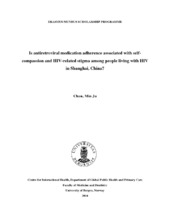| dc.description.abstract | Anti-retroviral medication (ARV) adherence plays an important role in successful treatment outcome and preventing further transmission. However, stigma is recognized as an obstacle to achieve optimal ARV medication adherence. Previous studies suggest that self-compassion may play a role in self-regulation of health promotion, which may improve medication adherence. Also, self- compassion may be a protective factor in coping with stigma. The objectives of this study were 1) to examine the association between demographic characteristics and ARV medication adherence; 2) to examine the association between self-compassion and ARV medication adherence; 3) to examine the association between stigma and ARV medication adherence; 4) to examine whether self-compassion modifies the association between stigma and ARV medication adherence. A cross-sectional survey with 107 participants in Shanghai, China was used in this secondary data analysis, within which 88 participants reported currently being on ARV medication. Logistic regression was used to test the association between medication adherence and independent variables: demographic characteristics, stigma and self-compassion. Bivariate correlation between self-compassion and stigma was also examined. To examine interaction, the analysis of the association between stigma and adherence was stratified by self-compassion. Participants who reported higher level of education, having health insurance, full time employment and enough income tended to be more adherent to medication. Categorical general perceived stigma was positively associated with adherence. Self-compassion was not significantly related to medication adherence, but sensitivity analysis showed that if two outliers were excluded, self-compassion was associated with medication adherence (AOR 1.10, 95% CI 1.00-1.21). Negative correlations were found between self- compassion and general perceived stigma and between self-compassion and stigma subscales. However, no significant interaction was detected for self-compassion to modify the association between stigma and adherence. | en_US |
